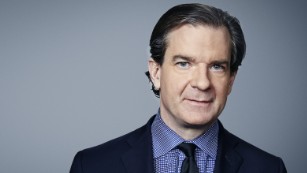Story highlights
- Bergen: The Times tries to defend piece offering an unsupported account of Osama bin Laden's killing
- He says history is about trying to get at the truth, not about treating all narratives equally
The New York Times triples down on bizarre bin Laden story
By Peter Bergen, CNN National Security Analyst Updated 3:15 PM ET, Sat October 24, 2015

Fact checking Joe Biden's new retelling of the Osama Bin Laden raid 02:21
Story highlights
Peter Bergen is CNN's national security analyst, a vice president at New America and a professor of practice at Arizona State University. He is the author of "Manhunt: The Ten-Year Search for bin Laden -- From 9/11 to Abbottabad."
(CNN)Last week the New York Times Magazine ran a cover story headlined, "What Do We Really Know about Osama bin Laden's Death?"
In the story, Times reporter Jonathan Mahler asserted that it was "impossible to know what was true and what wasn't" about the saga of the hunt for bin Laden and his death in Pakistan, a story that he asserted is now "floating somewhere between fact and mythology." Mahler wrote at length about investigative reporter Seymour Hersh, who authored a piece in May in the London Review of Books asserting that every element of the story of the hunt for bin Laden and his death that has been widely and exhaustively reported was false. Hersh maintained that the 2011 raid on the compound where bin Laden was hiding in Pakistan was not a firefight involving U.S. Navy SEALs, but instead was a piece of theater in which Pakistani officials gave bin Laden to the SEALs so that he could be executed.

Peter Bergen
In Hersh's account, Obama and many of his senior advisers have for the past four years been spinning a dense web of lies about the hunt for bin Laden. Those advisers included then-Secretary of State Hillary Clinton, who may well be the next president of the United States. If that were true, wouldn't the Times' own reporters who have been covering Clinton aggressively about her private computer server be all over this? And wouldn't her Republican critics in Congress, who have for the past year and half been examining the attack in Benghazi ad nauseam, also be all over it? But, strangely, this hasn't happened.Veteran Washington Post national security reporter Greg Miller tore Mahler's story apart. So too did Mark Bowden, who is the dean of American reporters covering U.S. special operations forces. So too did this reporter, who has written four books about bin Laden and al-Qaeda. In a piece headlined, "What do we know about Osama bin Laden's death? Quite a lot, actually," Miller nicely summarized the case against both Mahler and Hersh: "There is remarkable agreement across antagonistic governments, credit-hungry security agencies and fiercely competitive news organizations on the most salient facts: that bin Laden was killed in a raid by U.S. Special Operations forces conducted without the cooperation or awareness of the Pakistani government after a decade-long CIA manhunt." Reporters at the Times who cover national security and foreign affairs protested Mahler's story as damaging the credibility of the newspaper, as it contradicts many thousands of words of the Times' own reporting about the hunt for bin Laden. Eric Schmitt, a national security reporter in the Times' Washington bureau who shared in a 2009 Pulitzer for his coverage of Pakistan, told the Times' public editor, Margaret Sullivan, that he agreed with the three articles that criticized Mahler's story. Schmitt also told her: "This article has struck a nerve among national security and foreign policy reporters at The New York Times, and elsewhere, like few I've seen in my three-plus decades at the paper." In a conference call with aggrieved reporters and editors on Monday, the executive editor of the Times, Dean Baquet, said that critics of Mahler's story were wrong because it wasn't a national security story per se, but rather "it was a media story ... a very good one." Baquet also told the Times' public editor, "This is a story that's been told from so many perspectives that it's hard for Americans to get straight what happened." The perspectives Baquet went on to cite were Hersh's reporting and the film "Zero Dark Thirty," which he said was "full off inaccuracies." "Zero Dark Thirty" is a movie, which is, yes, replete with inaccuracies, not least that a young CIA analyst played by Jessica Chastain is portrayed as the only U.S. government employee who really wanted to find bin Laden. Next Baquet will be gravely informing Times' readers that "The Sound of Music" isn't an accurate account of Hitler's seizure of Austria, or that "Mary Poppins" isn't an accurate portrayal of how domestic servants lived in early-20th-century London.
Baquet's defense of Mahler's story -- that it is a "very good" piece of media criticism -- is baloney. And surely Baquet -- who has had a well-regarded career as the editor of both the Los Angeles Times and the New York Times -- knows it deep down. A serious piece of media criticism would have taken Hersh's piece apart; the many holes in his narrative are contradicted by dozens of on-the-record accounts of key players, from the SEALs on the ground in Pakistan to the Cabinet officers in the Situation Room. Hersh instead relied on a single unnamed source for his alternative narrative.
Imagine for a minute that Mahler's 7,500-word cover story about the hunt for bin Laden was about the media coverage of climate change, and that it featured mostly the work of a climate-change denialist. Imagine also that the piece asserted that the evidence that human actions are causing climate change lay somewhere "between fact and mythology." That is hardly a piece that would be published by the Columbia Journalism Review, is it?
Mahler rose to his own defense with a slight rebuttal that made no mention of Hersh and his theories, but it noted that Vice President Joe Biden earlier this week had amended his story about the advice he gave Obama about whether to authorize the bin Laden raid, and this purportedly showed how much was still unsettled about the history of the hunt for al-Qaeda's leader.
Biden and Obama have both previously publicly said that Biden advised against the bin Laden raid. In Biden's new account, he said he told Obama "I thought he should go but to follow his own instincts."
This would be, as Mahler himself concedes, a "minor" change in the overall history of the raid. But even so, for someone who supposedly is bringing a critical lens to the bin Laden story, Mahler is as credulous about Biden's new account as he was about Hersh's.
Biden's new account came before he announced that he wasn't running for president. The vice president also claimed that no one other than CIA director Leon Panetta advised Obama to do the raid. In fact, Clinton also gave a green light to the raid, and surely Biden was aware that his bad advice, against her good advice, put him at a disadvantage in a potential run for president.
According to multiple officials who were present at the final National Security Council meeting to determine whether to authorize the raid, Biden said, "We need greater certainty that bin Laden is there ... Mr. President, my suggestion is: Don't go." By contrast, Clinton said, "It's a very close call, but I would say: Do the raid."
History can, of course, be revised based on new accounts that emerge (which happens all the time) but those changes need to be based on credible evidence, which Hersh hasn't provided.
Mahler and his editors at the New York Times Magazine seem to have embraced the postmodern view that instead of practicing journalism or history in which you do the best to ferret out the truth, you only have competing "narratives" like Hersh's, each of which is worthy of serious attention. This is the kind of thing you might be taught in an undergrad course in literary theory, but is hardly what you expect from the "newspaper of record."

